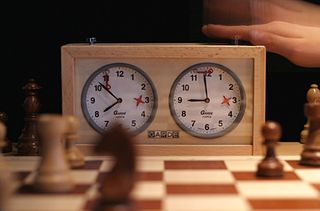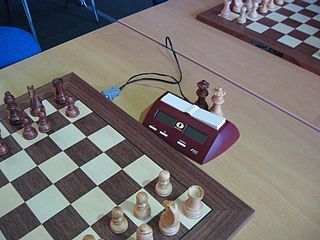Related Research Articles

A chess clock consists of two adjacent clocks with buttons to stop one clock while starting the other, so that the two clocks never run simultaneously. Chess clocks are used in chess and other two-player games where the players move in turn, and in some legal settings where each side is allotted a specific amount of time for arguments. The purpose is to keep track of the total time each player takes for their own moves, and ensure that neither player overly delays the game.

The rules of chess govern the play of the game of chess. While the exact origins of chess are unclear, modern rules first took form during the Middle Ages. The rules continued to be slightly modified until the early 19th century, when they reached essentially their current form. The rules also varied somewhat from place to place. Today, the standard rules are set by FIDE, the international governing body for chess. Slight modifications are made by some national organizations for their own purposes. There are variations of the rules for fast chess, correspondence chess, online chess, and Chess960.

A time control is a mechanism in the tournament play of almost all two-player board games so that each round of the match can finish in a timely way and the tournament can proceed. Time controls are typically enforced by means of a game clock, where the times below are given per player. Time pressure is the situation of having very little time on a player's clock to complete their remaining moves.
This glossary of chess explains commonly used terms in chess, in alphabetical order. Some of these terms have their own pages, like fork and pin. For a list of unorthodox chess pieces, see Fairy chess piece; for a list of terms specific to chess problems, see Glossary of chess problems; for a list of named opening lines, see List of chess openings; for a list of chess-related games, see List of chess variants.
The fifty-move rule in chess states that a player can claim a draw if no capture has been made and no pawn has been moved in the last fifty moves. The purpose of this rule is to prevent a player with no chance of winning from obstinately continuing to play indefinitely or seeking to win by tiring the opponent.
In chess, there are a number of ways that a game can end in a draw, neither player winning. Draws are codified by various rules of chess including stalemate, threefold repetition, and the fifty-move rule. Under the standard FIDE rules, a draw also occurs in a "dead position", when no sequence of legal moves can lead to checkmate, most commonly when neither player has sufficient material to checkmate the opponent.
In chess, the threefold repetition rule states that a player may claim a draw if the same position occurs three times during the game. The rule is also known as repetition of position and, in the USCF rules, as triple occurrence of position. Two positions are by definition "the same" if the same types of pieces occupy the same squares, the same player has the move, the remaining castling rights are the same and the possibility to capture en passant is the same. The repeated positions need not occur in succession. The reasoning behind the rule is that if the position occurs three times, no real progress is being made and the game could hypothetically continue indefinitely.
A game of chess can end in a draw by agreement. A player may offer a draw at any stage of a game; if the opponent accepts, the game is a draw. The majority of draws in chess are by agreement.

Fast chess is a type of chess in which each player is given less time to consider their moves than normal tournament time controls allow. Fast chess is subdivided, by decreasing time controls, into rapid chess, blitz chess, and bullet chess. Armageddon chess is a particular variation of fast chess in which different rules apply for each of the two players.

In chess, promotion is the replacement of a pawn with a new queen, rook, bishop, or knight of the same color. It occurs immediately when the pawn moves to its last rank, with the player choosing the piece of promotion. The new piece does not have to be a previously captured piece. Promotion is mandatory; the pawn cannot remain as a pawn.
In chess, a blunder is a critically bad move. It is usually caused by some tactical oversight, whether it be from time trouble, overconfidence or carelessness. Although blunders are more common in amateur games, all human players make them, even at the world championship level. Creating opportunities for the opponent to blunder is an important skill in over the board chess.
Cheating in chess is a deliberate violation of the rules of chess or other behaviour that is intended to give an unfair advantage to a player or team. Cheating can occur in many forms and can take place before, during, or after a game. Commonly cited instances of cheating include: collusion with spectators or other players, use of chess engines during play, rating manipulation, and violations of the touch-move rule. Many suspiciously motivated practices are not comprehensively covered by the rules of chess. On ethical or moral grounds only, such practices may be judged by some as acceptable, and by others as cheating.
The Women's World Chess Championship 2008 took place from August 28, 2008 to September 18 in Nalchik, Russia. It was won by Alexandra Kosteniuk, who beat Hou Yifan in the final by 2½ to 1½.

A chess tournament is a series of chess games played competitively to determine a winning individual or team. Since the first international chess tournament in London, 1851, chess tournaments have become the standard form of chess competition among serious players.

The World Blitz Chess Championship is a chess tournament held to determine the world champion in chess played under blitz time controls. Since 2012, FIDE has held an annual joint rapid and blitz chess tournament and billed it as the World Rapid & Blitz Chess Championships. The current world blitz champion is the French grandmaster Maxime Vachier-Lagrave. Bibisara Assaubayeva from Kazakhstan is the current women's blitz world champion.
The World Rapid Chess Championship is a chess tournament held to determine the world champion in chess played under rapid time controls. Prior to 2012, FIDE gave such recognition to a limited number of tournaments, with non-FIDE recognized tournaments annually naming a world rapid champion of their own. Since 2012, FIDE has held an annual joint rapid and blitz chess tournament and billed it as the World Rapid & Blitz Chess Championships. FIDE also holds the Women's World Rapid & Blitz Chess Championship. The current rapid world champion is the Uzbek grandmaster Nodirbek Abdusattorov. Alexandra Kosteniuk from Russia is the current women's rapid world champion.
Some board games, such as chess and Go, use an adjournment mechanism to suspend the game in progress so it can be continued at another time, typically the following day. The rationale is that games often extend in duration beyond what is reasonable for a single session of play. There may be a sealed move: the next move that would be made is sealed in an envelope, to be played out when the game resumes. This practice ensures that neither player knows what the board position will be when it is their next turn to move.

The 2018 Women's World Chess Championship Match was a match held between Tan Zhongyi, the 2017 Women's World Chess champion, and her challenger Ju Wenjun to determine the new women's world chess champion. Ju Wenjun qualified by winning the FIDE Women's Grand Prix 2015–16.

The Chess World Cup 2019 was a 128-player single-elimination chess tournament that took place in Khanty-Mansiysk, Russia, from 9 September to 4 October 2019. It was won by Azerbaijani grandmaster Teimour Radjabov. He and the runner-up, Ding Liren, both qualified for the Candidates Tournament for the World Chess Championship 2020. It was the 8th edition of the Chess World Cup.

The World Chess Championship 2021 was a chess match between the reigning world champion Magnus Carlsen and the challenger Ian Nepomniachtchi to determine the World Chess Champion. It was held under the auspices of FIDE and played during Expo 2020 at Dubai Exhibition Centre in Dubai, United Arab Emirates, between 24 November and 12 December 2021. It was originally scheduled for the latter half of 2020, but was postponed until 2021 because of the COVID-19 pandemic. As a result, this is the first ever sporting event to be held at an international exposition since the 1904 Summer Olympics during the Louisiana Purchase Exposition in St. Louis, United States.
References
- 1 2 Hansen, Lars Bo (October 7, 2008). How Chess Games are Won and Lost. Gambit. ISBN 978-1-906454-01-2.
- 1 2 3 Webb, Simon (1979). Chess for Tigers. Oxford University Press.
- ↑ FIDE Laws of Chess Articles 8.4 to 8.6
- ↑ FIDE Laws of Chess Article III.4 and III.5
- ↑ Gijssen, Geurt (2009). "The Tal Memorial and Blitz Chess (An Arbiter's Notebook)" (PDF). The Chess Cafe. Retrieved 21 February 2010.